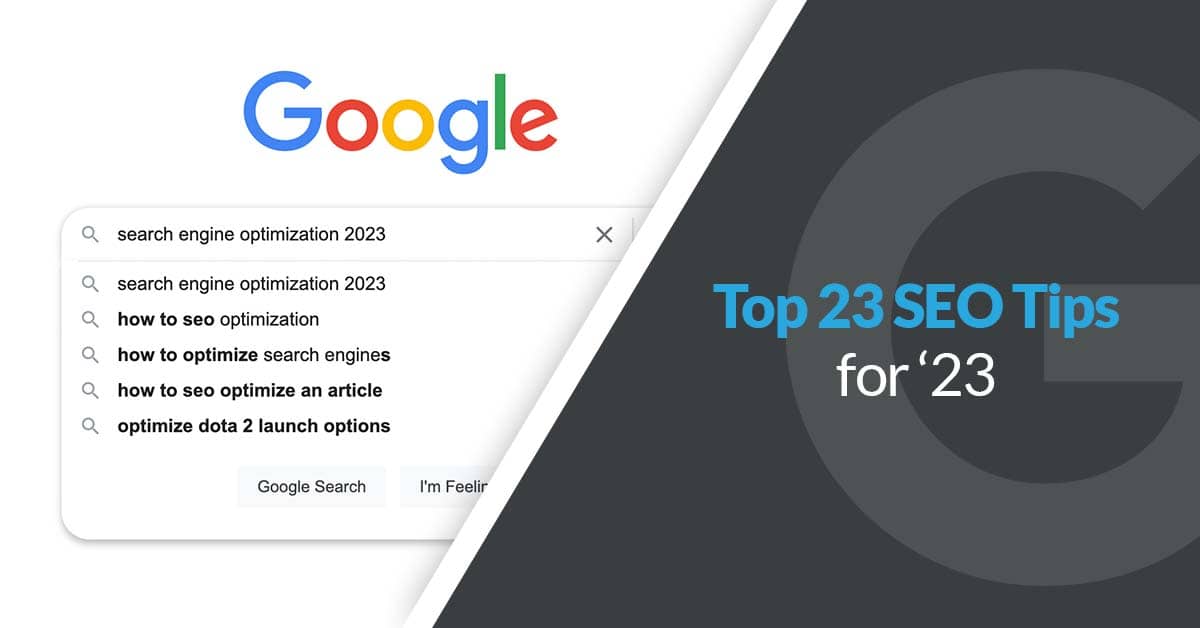How Google Search Works in 2023
10 Minute Read
You’ve seen plenty of articles on SEO best practices, ranking factors, and other essentials for search engine optimization. While some sources provide reliable, quality information, far too many SEO “experts” rely on guesswork and speculation rather than knuckling down and identifying what it really takes to rank.
Search engine optimization is constantly evolving, and there are a lot of technical aspects that business owners, in-house marketers, and even webmasters have trouble handling on their own. Unscrupulous agencies with more salesmanship than skill will try to take advantage of this, overpromising on rankings and making excuses when their strategies fall short.
At Twelve Three Media, we don’t make guesses on what works; we know, and we empower our clients to know what they don’t know, too. That’s because we draw on authoritative resources like Google Search Central rather than relying on clickbait from a bunch of poseurs.
SEO in 2023: What You Need to Know
Google might update its algorithms regularly, but there are fundamental processes and features that are essential for SEO success that remain relatively unchanged with time. Here are the most important components for maximizing your rankings in 2023:
1. BERT
BERT stands for “Bidirectional Encoder Representations from Transformers.” Not sure what that means? Most people wouldn’t, but Google offers some clarification:
“Launched in 2019, BERT was a huge step change in natural language understanding, helping us understand how combinations of words express different meanings and intents. Rather than simply searching for content that matches individual words, BERT comprehends how a combination of words expresses a complex idea.”
Google uses machine learning for a number of different purposes. For SEOs, one of the most important of these uses is understanding the intent behind the keywords and phrases users search.
Language is complex, and it would be impossible for search engines to identify every conceivable variation of a query and deliver the most relevant results. BERT enables Google to fill in these gaps.

For SEO marketers, the challenge is capitalizing on the many different variations of search terms and maximizing a client’s rankings across a variety of queries (rather than fixating on a static keyword list).
Read More: Can SEO Be Replaced by Machine Learning?
2. Clickthrough Rate
Clickthrough rate (or CTR) is a measure of how many users click a search result and arrive on your website. At its most basic level, a click is essentially a vote that tells Google your site answers the user’s search query.
To maximize clickthrough rate, you first need to optimize your title tag and description so it aligns with the searcher’s intent. Once visitors arrive on the site, the content should serve their needs and, ideally, drive conversions.
3. Conversion Rate
Let’s get one thing straight: Conversions do not have a direct impact on SEO performance. A conversion occurs when a user takes a specific action that meets one of your business goals (such as filling out a form), which doesn’t always occur as a result of organic website visits.
Conversion rate optimization is the process of improving the user experience. Many of the changes involved (such as reducing page load time, facilitating easy navigation to other pages on your website, etc.) can also have a beneficial effect on your search rankings.
Read More: Why Does Page Speed Matter?
4. Crisis Information Systems
As the name suggests, Google’s crisis information systems deliver relevant and reliable information to people facing personal crises, natural disasters, and more. Most businesses don’t deal in these “life-and-death” scenarios but, for those who do, providing the most valuable, authoritative content for users in crisis is a must for ranking at the top of the SERPs.
5. Deduplication Systems
There is only one position #1 on the search results page (or a featured snippet, if that’s served first). Google lists less-relevant results in descending order on the SERPs. If you scroll down enough, you might encounter a message that similar entries were omitted from the results.
Bottom line: You need your content to stand out if you want to rank in search. If your website content is basically the same as that of your competitors, you’re going to rank lower (or maybe not be included in the results at all).
6. Dwell Time
The length of time a user stays on a web page after arriving from the SERPs is the dwell time. In Google Analytics, it is listed as “Avg. time on page.”
Content that fully answers a visitor’s query should result in a longer dwell time. As such, Google will consider the time spent on the page (as well as associated metrics like bounce rate and exit rate) as a signal of the page’s usefulness for a given query.
7. Exact Match Domain Systems
For years, SEOs have promoted exact match domains (that is, website domains that exactly match a high-value keyword phrase) as a major factor for ranking in search. However, Google itself says that its systems are designed to not “give too much credit for content hosted under domains designed to exactly match particular queries.”
Starting a new business or creating a new website? If an SEO consultant is promising you great results if you opt for an exact match domain, don’t you believe it.

8. Freshness Systems
Not a device for prolonging the shelf life of produce but a way for Google to offer the best search results by crawling pages for updated information. Offering the most up-to-date information for a particular query can only help you in the rankings, so be sure to invest in blogging, updates to your web pages, and more.
9. Helpful Content System
“Our helpful content system is designed to better ensure people see original, helpful content written by people, for people, in search results, rather than content made primarily to gain search engine traffic.”
SEO agencies that write content in an effort to “game the system” do their clients a disservice. Google has systems in place to prioritize content that is geared toward the users; if your content reads like it’s written for robots, your agency isn’t doing you any favors.
10. Link Analysis Systems and PageRank
Link structure within a website is one of the most overlooked intersections between SEO and web development. It is not enough to have a bunch of high-quality, perfectly optimized pages. The content on your website needs to be linked so users can navigate through the site with ease and search engines can understand how pages connect to one another.
PageRank is one of Google’s foundational algorithms. It assigns a weighted value to a web page based on the domains linking to it. The more links from authoritative domains to your page, the higher the PageRank score and the better positioned your page will be to rank in search.
11. Local Search
Businesses with brick-and-mortar locations need to dominate local search to thrive. There are multiple ways to optimize for local SEO, including:
- Claim your Google Business Profile
- Optimize for mobile (more than three-quarters of shoppers search for local businesses on their phones)
- Get reviews from local customers
- Build a local following on social media
- Ensure consistency across all citations (name, address, and phone number, or NAP data)
- Cultivate link building and content sharing relationships with the websites for local businesses, publications, etc.
Read More: How to Claim and Optimize Your Google Business Profile
12. MUM
No, not your mom, but Multitask Unified Model (MUM). This AI system allows Google to determine whether there is a consensus on points of fact. MUM is crucial for Google’s delivery of featured snippets.

Only the most authoritative and informative pages are ranked in the position zero/featured snippet section of the SERPs. When writing content of your own, it is important to consult authoritative sources to understand any consensus on a given topic, then ensure that the content is optimized for the user’s search query.
13. Neural Matching
Google has been using neural matching in search for about 5 years. According to Google:
“Neural matching helps us understand fuzzier representations of concepts in queries and pages, and match them to one another. It looks at an entire query or page rather than just keywords, developing a better understanding of the underlying concepts represented in them.”
Like BERT, neural matching allows Google to understand the connections between page content and what searchers mean when they enter a specific query. Google is casting a “wide net” to uncover and deliver relevant content, which is further evidence of the diminishing importance of writing content and optimizing solely for specific keywords and the emergence of more query-focused optimization and content writing.
14. Original Content Systems
It is a longstanding myth that Google penalizes websites with duplicate content. However, the search engine does reward original content with better rankings.
Bargain-basement SEO agencies (especially those dedicated to crowded and competitive industries) often employ a library of boilerplate content for hundreds or even thousands of their clients’ websites. Although your website won’t be dinged for using duplicate content, you’re unlikely to rank ahead of sites that use original material geared toward the user’s specific search.
15. Page Experience System
As discussed above, a great user experience is key not only for driving conversions but ranking in search as well. Google’s page experience system takes into account a number of different factors in determining whether a web page offers a superior experience for users:
- Core Web Vitals performance (i.e., how long before the page loads, is interactive, and visually stable?)
- Mobile-friendliness (i.e., does the page work on mobile?)
- HTTPS implementation (i.e., is the page secure?)
- “No intrusive interstitials” (i.e., “The content on the page is easily accessible to the user”)
Many aspects of the page experience are technical in nature. Small and medium-sized businesses will likely need to hire a web development agency to make updates.
Read More: How Often Should You Redesign Your Website?
16. Passage Ranking
Google has noted the challenges of identifying the most relevant information for extremely specific queries. The passage ranking AI dives deep into the content on a page to gain the understanding needed to deliver the most relevant result for niche queries.
Passage ranking presents a major opportunity for businesses to present themselves as subject matter experts. If you identify niche queries related to your products and services and develop content to address the specific questions users have, you will likely see an improvement in your rankings (potentially including appearances in the featured snippet).
17. Product Reviews System
Any businesses that sell products need a wealth of reviews for their offerings to stand out in search. Product reviews are assessed at the page level, so it is of the utmost importance for ecommerce businesses to publish reviews directly to the website or enable reviews on third-party platforms to be pulled onto the product page.
18. Proximity to Searcher
Where the user is in relation to your business location plays a major role in what search results are displayed. As discussed elsewhere, you need to make sure all aspects of your local SEO (e.g., your Google Business Profile, NAP data, etc.) are dialed in so users in the vicinity can find you.
One SEO practice that will not help you optimize your local SEO is regularly Googling your own business name. Unless you are in close proximity to your office or store, the results you see when you are at home or across town are not what a customer nearby will see in search. This can make it difficult to optimize your local presence properly, as well as skew the local search results.
Read More: How Googling Yourself Can Hurt or Help Your SEO
19. RankBrain
RankBrain was the very first AI system Google launched to improve its search capabilities. As with BERT and neural matching, RankBrain “is used to help rank — or decide the best order for — top search results” by providing Google with the context needed to make connections between specific words and larger concepts.
Countless SEOs have said RankBrain is dead and it no longer influences Google search. Well, here is an official Google property discussing how RankBrain is used in Google rankings. Seems like a safe bet the system is still alive and well.
20. Reliable Information Systems
Online information moves at a mind-boggling pace. Google has implemented a number of systems to help provide users with reliable information, including the usual preference given to authoritative content, tips for better searches, and content advisories for novel, emerging, and changing topics.
21. Removal-Based Demotion Systems
Google may remove content from the search results for issues such as copyright infringement complaints and exploitation of an individual’s personal information. Most companies that obey the law and conduct business ethically will never have issues with content demotion or removal. Nonetheless, it is important to be aware of these systems and the impact they may have on your rankings.
22. Site Diversity System
Diversity in search rankings means displaying results from multiple domains. As a rule, users won’t see more than two results from the same website for a given search.
However, if multiple results from the same site provide the best answer to a particular query, it may be possible for a single domain to take up more of the “real estate” on the SERPs. This increases the likelihood of a click and, potentially, a conversion.
23. Spam Detection Systems
Spam ranges from irrelevant or low-quality content to pages that pose a security risk. Google uses a host of automated programs to detect spam and remove it from the search results.
Webmasters may receive notifications that their website has been blocked or it is labeled dangerous. Google provides options for addressing spam issues and getting your website back in the rankings.

Maximize Your Google Rankings This Year
Every business owner views the start of a new year as an opportunity to grow and set new goals. If you are looking at your marketing budget and wondering what you can accomplish with SEO, it is important to know whether your agency has the knowledge, experience, and understanding of your business to drive results.
Twelve Three Media takes a different approach to SEO than most agencies. We pride ourselves not only on getting our clients the top spot in search but empowering them to understand how search engines work and what effective marketing can do to help them reach their objectives.
